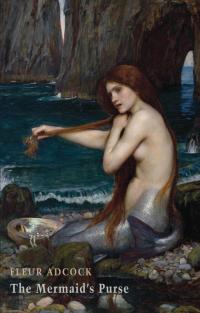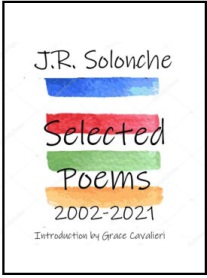
Fleur Adcock, The Mermaid’s Purse,
Bloodaxe Books, 2021. ISBN 9781780375700. 87pp. £10.99.
Watching Adcock zoom-launch her latest book, which she started writing at a sprightly 82 years young, was a delight, and reading the poems from the page has been no less fun. Reviewing for the Guardian, Poetry Foundation’s Fiona Sampson commented on their ‘informality and immediacy’ and these qualities are abundantly evident in this chubby collection. That is not to say that one does not at times need to linger, or choose to return to individual poems, to excavate deeper meanings or simply have the pleasure of re-visiting a vividly conveyed scenario or bon mot. ‘I have a watch. He has the time’ is such a great final line for a poem ostensibly about picking blackberries, but also about aging.
The title poem sets the mood – conversational, witty and deceptively profound:
So where do we go from here? Down, down,
where the eels go. Don’t wait for me –
I’ll be along later.
Maritime settings and references abound, as might be expected for a poet whose domiciles oscillate between the island nations of New Zealand and Great Britain, and the colours, sights and sounds of season and place resonate vividly on every page. There is at once both great skill and an easy freshness and lightness of touch which is simultaneously wise and child-like. Several of the poems start in medias res, capturing the sense of a child who interrupts the grown-ups: ‘Or you might prefer to read about the Christmas / When after all the hosting and feasts / We finally got the kids off to bed…’ (‘The Other Christmas Poem’).
This poem, like several others, creates the illusion of the reader being part of the poet’s friendship circle, where Ruth, Alex, Meg, Peter, Beryl and others pop up unannounced to perform in the chorus line of Adcock’s show.
Adcock has the enviable ability to create a poem about anything – rescuing bugs the cat has brought in (and sadly disposing of fledglings); the colour of the coat she was wearing when she first met ‘Mike;’ the benefits of learning Welsh, ‘such an exacting discipline;’ ruminations on the origins of the word ‘tatterdemalion.’ The apparently guile-less span of her interests and moments of frivolity belies a consistently reliable and finely honed craft which makes each poem a delight to read.
At the end is a sequence of ten poems dedicated to Roy Fisher who died in 2017; here the colloquial tone is nicely mis-matched to the content of the poems where she reports ‘…My target is mouldy old Death, who keeps grabbing my friends.’ In this set, as elsewhere, her eye and ear for the covert messages of non-human creatures (‘An April Bat’) make a strong connection between poet and natural world. Whilst the ‘Dead Poets’ Society’ she alludes to here does indeed have many worthy members, one hopes she will not join it any time soon.
Hannah Stone
To order this book click here
Hannah Stone is the author of Lodestone (Stairwell Books, 2016), Missing Miles (Indigo Dream Publishing, 2017), Swn y Morloi (Maytree Press, 2019) and several collaborations, including Fit to Bust with Pamela Scobie (Runcible Spoon, 2020). She convenes the poets/composers forum for Leeds Lieder, curates Nowt but Verse for Leeds Library, is poet-theologian in Virtual Residence for Leeds Church Institute and editor of the literary journal Dream Catcher. Contact her on hannahstone14@hotmail.com for readings, workshops or book purchases.
J R Solonche, Selected Poems 2002-2021, Serving House Books, 2021,
ISBN: 978-1-947175-51-8. 443pp.
$17.95 €14.44
For those readers who have not yet had the pleasure of making the acquaintance of J R Solonche, this hefty tome offers a satisfying and easily available introduction to his work. The selection has been trawled from no less than 22 collections, an impressive and prodigious output within the time frame. Such productivity might warrant the accusation of being excessive and compromising on quality but in Solonche’s case I would argue that less is not more, for the range and variety of his work continually impresses.
To get around the sheer volume of his work, perhaps the ideal way to experience Solonche in this digital age would be an email service providing a daily poem from the complete oeuvre or if one poem a day proved insufficient a sort of playlist on shuffle would be ideal. The thought of these gems popping up at random on one’s screen would be a continual source of pleasure and refreshment. Chase Twichell is right when she says in an endorsement at the front of the book: “J R Solonche’s poems induce in me a state of delighted surprise.”
When a friend asked me recently what sort of poet J R Solonche is, I had a ready answer: “He’s a cross between Groucho Marx and Wittgenstein.” However, while there’s an element of truth in this characterisation, it would be reductive to perceive Solonche purely in these terms because there is much more to be found in his work than wise cracks and epigrammatic philosophising. A seemingly inexhaustible creativity is at work here. This is reinforced by a skilled technical ability with fixed forms. An excellent example of this is The Path, with its deftly controlled rhythms and imagery:
I see myself in the glass
of the door, a shadow, hurled
through the zero of the world…
to read the maples lost
in light, to read the frost
coming on…
to read the man
looking back in the glass
like a book I read once
and since have forgotten
The tone of the poem reveals an aspect of Solonche that might easily be overlooked for those readers with only a cursory awareness of his work: a ruminative bent that at times achieves a redolence that can be poignant. Not only does he stand in the American tradition of a comedic tradition that goes back to Mark Twain but also an elegiac voice that places him with the Whitman of When Lilacs Last in the Dooryard Bloom’d and the poet he most admires, Emily Dickinson. We see this at work in To My Favourite Corduroy Jacket, which while clearly mock heroic in mode is also undeniably moving, as in the closing lines:
that we will become dust
together, that together we will
become dust of corduroy, dust
of man, that we will become
dust of corduroy man, and together
hold up the ceiling of the closet
of the earth all summer, all fall,
all winter, all spring? Forever?
While acknowledging this aspect of his work, one mustn’t lose sight of another quality, much needed in the current climate of ‘alternative facts’ and that is his irreverence. This is not to be mistaken for cynicism as he does know value when he sees it but he is more than happy to overturn shibboleths when he comes across them. To this end, he is in possession of a smart piece of kit, recommended by Ernest Hemingway, a very effective bullshit detector. Reinforcing that is an unwavering eye for the absurd. Solonche’s work does for poetry what The Big Lebowski did for film making. It is iconoclastic, funny and beaming with what abides beyond the ostensible mischief. While subverting expectations it celebrates and shines.
To this end, he is not averse to appropriating the words of others in his restless search for the offbeat aspects of the human comedy. In this respect he is happy to sidestep the role of ‘poet’, foregoing the perspective of the egotistical sublime, letting others take centre stage. For instance, one of Solonche’s hapless students provides the following koan-like gem, entitled The Best Ever Student Definition of Poetry :
Poetry is how to
say what cannot be
expressed in words
It is therefore not surprising that he is a habitual collector and curator of found poems, and has published a whole collection in this genre: I, Emily Dickinson and other Found Poems. In this respect he reveals himself as a reader of the world, and through this is enabled to assume its multi-faceted mouthpiece.
This does not mean that Solonche is not interested in the business of poetry. Indeed it might seem fair game to upbraid him for writing too many poems on the subject of poetry. This is to ignore how vibrant all these self-reflexive poems are. They are not in the least precious. Take My Last Poem for instance, which deconstructs itself at the same time as embodying all that is vital and memorialising about the best poetry:
It will be lifted up to be read.
Then the words will fall, slantwise,
from the page into the palm of my hand.
There they will leave a fragrance at once familiar and strange.
No amount of water, nor any of
prose, will ever wash it away.
Solonche doesn’t just live poetry, he embodies it. Here is poetry that gives you the news, delivered straight to your door with a wakeup call impossible to ignore. Furthermore, Solonche has not only a distinctive voice but a truly unique one, something that is frequently claimed but rarely achieved. I will leave the final comment to Grace Cavalieri, who writes in her acute introduction: “The absolute best remark I can make about this book is that I would give it to non-readers of poems as a conversion to poetry.”
David Mark Williams
To order this book click here
David Mark Williams writes poetry and short fiction. He has two collections of poetry published: The Odd Sock Exchange (Cinnamon, 2015) and Papaya Fantasia (Hedgehog, 2018). For more information go to www.davidmarkwilliams.co.uk




